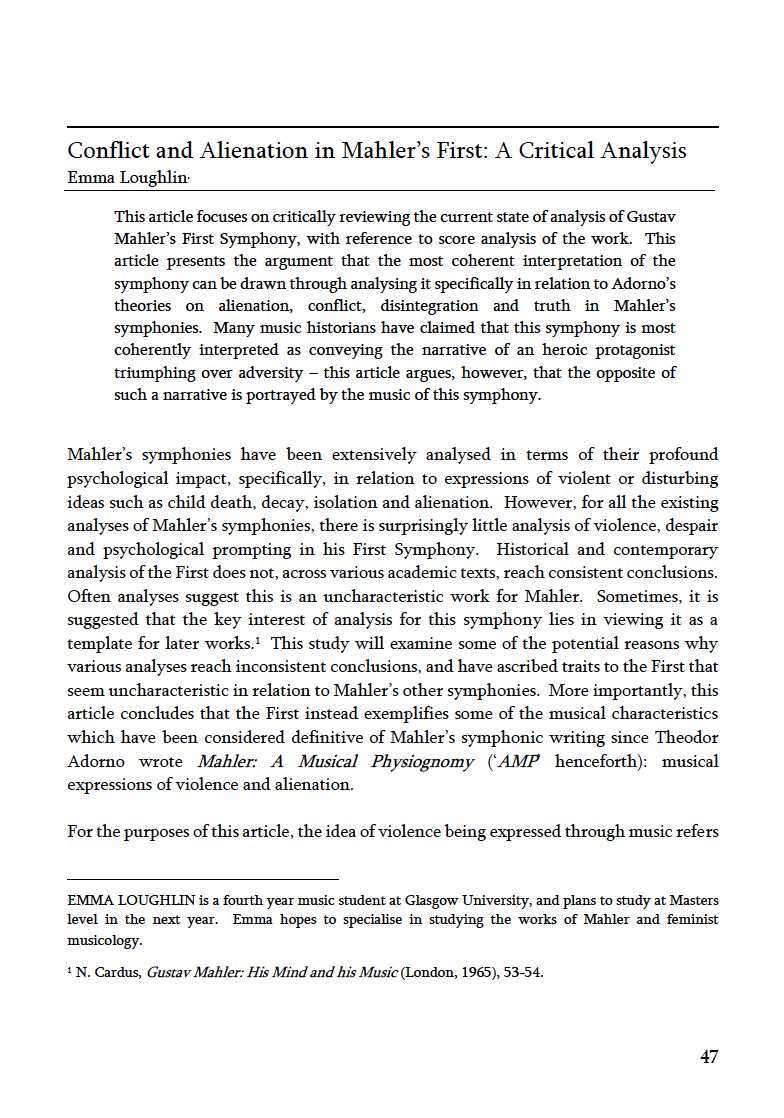Conflict and Alienation in Mahler’s First
A Critical Analysis
DOI:
https://doi.org/10.36399/GroundingsUG.9.197Keywords:
Mahler, Mahler's First, Conflict, Alienation, AnalysisAbstract
This article focuses on critically reviewing the current state of analysis of Gustav Mahler’s First Symphony, with reference to score analysis of the work. This article presents the argument that the most coherent interpretation of the symphony can be drawn through analysing it specifically in relation to Adorno’s theories on alienation, conflict, disintegration and truth in Mahler’s symphonies. Many music historians have claimed that this symphony is most coherently interpreted as conveying the narrative of an heroic protagonist triumphing over adversity – this article argues, however, that the opposite of such a narrative is portrayed by the music of this symphony.
References
T. W. Adorno, Mahler: A Musical Physiognomy (The University of Chicago Press, Ltd., 1992).
P. Barford, Mahler Symphonies and Songs (British Broadcasting Corporation, 1970).
N. Cardus, Gustav Mahler: His Mind and his Music (The Camelot Press Ltd,1965).
C. Dahlhaus, Nineteenth-Century Music (University of California Press, 1989), translated from German by J. Bradford Robinson.
A. David, Beethoven’s Influence on Modern Musical Thought. Available at: http://digitalcommons.colby.edu/cgi/viewcontent.cgi?article=1010&context=ugrs, 2007.
S. Downes, After Mahler: Britten, Weill, Henze and Romantic Redemption (Cambridge University Press, 2013).
C. Floros, Gustav Mahler: The Symphonies (Amadeus Press, 1993), translated from German by Vernon Wicker.
J. Holly, A Presentation on the Life and Music of Ludwig van Beethoven. Available at: online publication: http://www.slideshare.net/jpholly/beethoven-27224139, 2013.
J. Johnson, Mahler's Voices: Expression and Irony in the Songs and Symphonies (Oxford University Press, 2009).
J. Johnson, article, The Breaking of the Voice (2011) 8 Nineteenth-Century Music Review, 179–195.
R. Knapp, Symphonic Metamorphoses: Subjectivity and Alienation in Mahler's Re-Cycled Songs (Wesleyan University Press, 2003).
H. A. Lea, Gustav Mahler: Man on the Margin (Bonn: Bouvier, 1985).
N. Lebrecht, Why Mahler? How one man and ten symphonies changed the world (Faber and Faber Ltd., 2010).
D. Mitchell, Gustav Mahler: The Wunderhorn Years (Faber and Faber Ltd., 1975).
K. Painter, Mahler and his World (Princeton University Press, 2002).
L. M. Smoley, Gustav Mahler's Symphonies: Critical Commentary on Recordings Since 1986 (Greenwood Press: Westport, 1996).
http://gustavmahler.com/symphonies/No1/1st-Movement-Themes-Motifs.html
http://www.bbc.co.uk/dna/ptop/plain/A11690660
http://www.recmusic.org/lieder/assemble_texts.html?LanguageId=7&SongCycleId=108

Published
Issue
Section
License
Copyright (c) 2016 Emma Loughlin

This work is licensed under a Creative Commons Attribution 4.0 International License.
The CC BY 4.0 license is a Creative Commons license. This is a non-copyleft free license that is good for art and entertainment works, and educational works. It is compatible with all versions of the GNU GPL; however, like all CC licenses, it should not be used on software. People are free to: Share — copy and redistribute the material in any medium or format; Adapt — remix, transform, and build upon the material for any purpose, even commercially. The licensor cannot revoke these freedoms as long as you follow the license terms. But they must conform to the following terms: Attribution — You must give appropriate credit, provide a link to the license, and indicate if changes were made. You may do so in any reasonable manner, but not in any way that suggests the licensor endorses you or your use. No additional restrictions — You may not apply legal terms or technological measures that legally restrict others from doing anything the license permits.
Please check individual article PDF copies to see if any additional restrictions apply.







